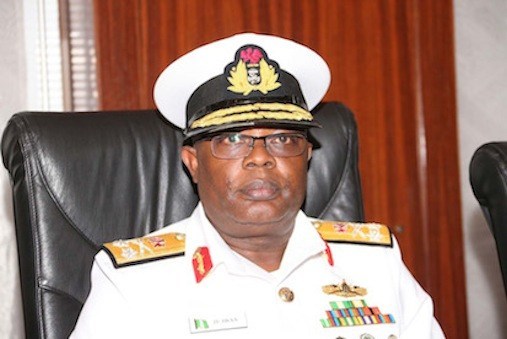The Chief of Naval Staff (CNS), Vice Admiral Ibok Ete-Ibas, has said maritime crimes threaten commerce in Nigeria’s waters particularly the kidnapping of ships’ crew for ransom.
He said this has negatively affected shipping costs and insurance premiums, which result in higher costs of goods and shipping services.
He made this known on Wednesday in Abuja, during a press conference to kick-start the Nigerian Navy 63rd anniversary celebrations scheduled from Wednesday 22 May to Saturday 1 June 2019.
Ete-Ibas, who was represented by the Chief of Policy and Plans, Nigerian Navy, Rear Admiral Begroy Ibe-Enwo said smuggling is another economic threat to Nigeria.
He said maritime insecurity exploits the vastness of Nigeria’s maritime environment to facilitate importation of contraband goods that have ripple effects on local productivity.
He said Nigeria has a coastline of about 420 nautical miles and an Exclusive Economic Zone (EEZ) that extends 200 nautical miles from the coast totalling about 84,000 square nautical miles of sea area.
He said the country relies on the sea for about 90 per cent of its import and export with oil being a major part of the trade.
He added that Nigeria’s maritime area of interest includes the entire Gulf of Guinea (GoG), with a total coastline of about 2,874 nautical miles translating to a maritime area of approximately 574,800 square nautical miles.
Daily Trust gathered that this can be compared to the land area that makes up more than half the size of West Africa.
Ebi-Enwo said this maritime area with its networks of oil and gas installations, as well as shipping, are threatened by maritime crimes.
These include; piracy/sea robbery, crude oil theft, illegal oil bunkering, Illegal Unreported and Unregulated Fishing (IUUF), insurgency and hostage-taking.
On the achievement of the Navy, he said the Federal Government has assisted in the delivery of several ships including offshore patrol vessels (OPVs), patrol crafts and a training ship.
He said since 2015, gains have been made in providing a secure maritime environment leading to increased output in maritime trade, particularly oil production.
He said in order to combat the threats in Nigeria’s maritime domain; the Navy adopted the Total Spectrum Maritime Strategy (TSMS) to guide its operational engagements.
He explained that the concept of operations is based on a proactive layered response to five conflict spectrums characterized by its distances from the coast.

 Join Daily Trust WhatsApp Community For Quick Access To News and Happenings Around You.
Join Daily Trust WhatsApp Community For Quick Access To News and Happenings Around You.


